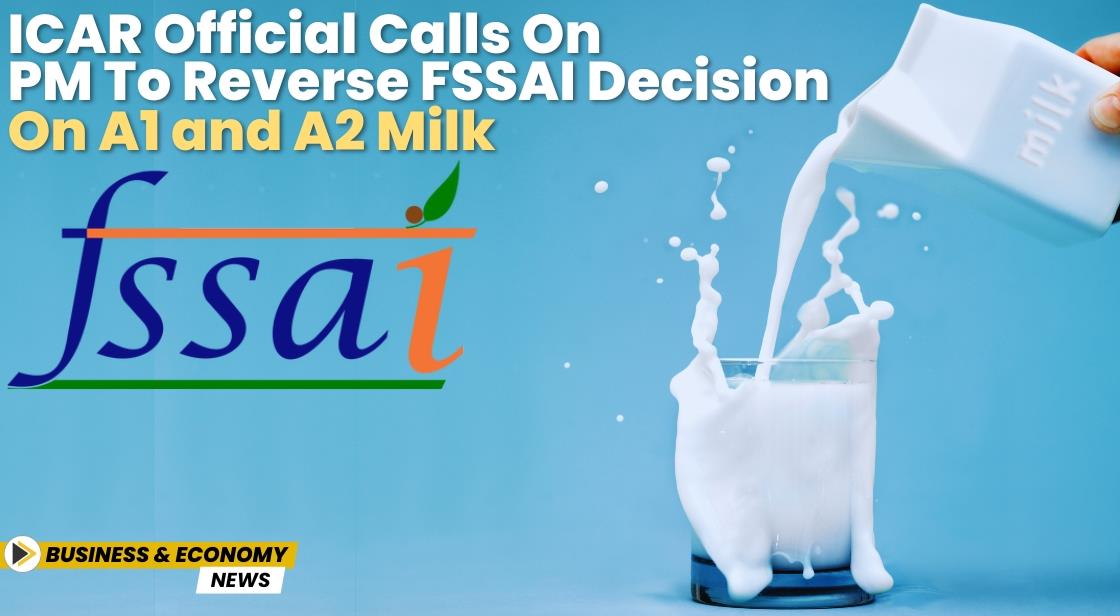ICAR Official Calls on PM to Reverse FSSAI Decision on A1 and A2 Milk

News Synopsis
The Food Safety and Standards Authority of India (FSSAI) recently issued a directive instructing dairy companies to refrain from using A1 and A2 labels on milk products. This decision has faced significant criticism from Venugopal Badaravada, a governing body member of the Indian Council for Agricultural Research (ICAR) and a renowned livestock expert. Badaravada has strongly opposed the FSSAI’s order and has reached out to Prime Minister Narendra Modi with a formal request to reconsider the directive.
Request for a High-Level Review Committee
In his communication to Prime Minister Modi, Badaravada has proposed the formation of a high-level committee of experts to review the FSSAI’s decision. He suggested that the committee should include representatives from various key ministries, including fisheries, animal husbandry and dairying, health and family welfare, as well as members from ICAR and other relevant experts. The committee’s primary task would be to clarify the regulations surrounding the marketing and labelling of milk products as A1 and A2, ensuring accurate recognition of the A1 and A2 proteins.
Badaravada expressed concern that the FSSAI's rapid regulation could potentially undermine consumer choice and adversely impact the future of indigenous cattle breeds. He emphasized the established benefits of A2 milk and argued that the current directive might not fully consider these benefits.
India’s Cattle Genetic Resources
In his letter to the Prime Minister, Badaravada highlighted the significance of India’s vast cattle genetic resources. India is home to approximately 190.9 million cattle and boasts 53 registered native breeds. However, with 26% of the country’s cattle population being crossbred, only 22% belong to registered indigenous breeds. The remaining 52% are classified as ‘non-descript’ cattle. Among the 53 registered breeds, only 8-10, which constitute around 10%, are recognized as milch breeds that produce A2 beta-casein.
Impact on Milk Production
India’s milk production has seen a notable increase, reaching a record 230.58 million tonnes (MT) in 2022-23, marking a 4.2% rise from previous years. Since 1998, India has held the title of the world’s largest milk producer. Badaravada underscored this achievement to stress the importance of maintaining standards that support the indigenous cattle breeds contributing to this production.
Historical Context of A2 Milk
Badaravada also referred to a significant event on December 10, 2016, when Prime Minister Modi launched ‘Amul Deshi A2 Cow Milk,’ sourced from the indigenous Kankrej cow breed in Deesa, Gujarat. At that time, Modi recognized the health benefits of A2 milk, particularly for children suffering from malnutrition. The emphasis was placed on the special minerals and proteins found in A2 milk from breeds like Kankrej and Gir, reinforcing the value of indigenous breeds in contributing to public health.
FSSAI’s Recent Communication
On August 21, 2024, the FSSAI issued a statement clarifying its stance on the A1 and A2 milk differentiation. According to the FSSAI, the differences between A1 and A2 milk are attributed to the structural variations in the beta-casein protein. The FSSAI deemed the use of A2 claims on milk fat products as misleading and not compliant with the Food Safety and Standards (FSS) Act. Consequently, the FSSAI directed food business operators to eliminate A1 and A2 claims or labels from dairy products, including milk, ghee, butter, and curd.
Conclusion: Call for Reconsideration
Venugopal Badaravada’s appeal to Prime Minister Modi highlights a crucial debate surrounding the regulation of A1 and A2 milk. By urging for the withdrawal of the FSSAI’s directive and advocating for a comprehensive review by a high-level committee, Badaravada aims to ensure that the interests of consumers and the future of indigenous cattle breeds are adequately protected. As the discussion continues, the outcome of this appeal could significantly impact how A1 and A2 milk products are marketed and regulated in India, reflecting the ongoing balance between food safety regulations and the preservation of traditional agricultural practices.
You May Like









